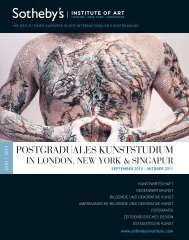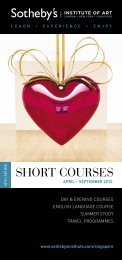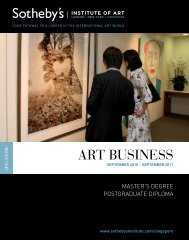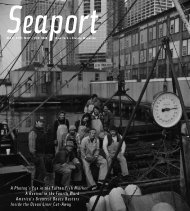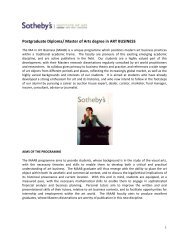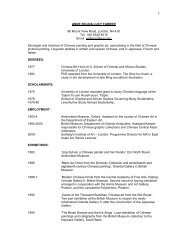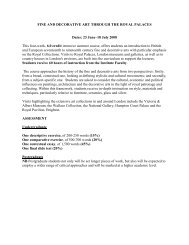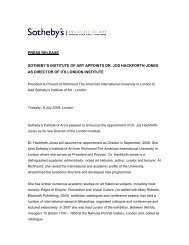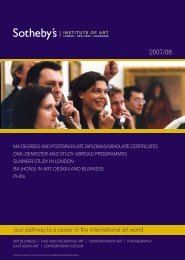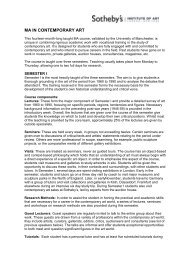Zones of Indistinction: Giorgio Agamben's Bare Life and
Zones of Indistinction: Giorgio Agamben's Bare Life and
Zones of Indistinction: Giorgio Agamben's Bare Life and
Create successful ePaper yourself
Turn your PDF publications into a flip-book with our unique Google optimized e-Paper software.
CTTE_A_384228.fm Page 112 Sunday, April 26, 2009 1:30 PM<br />
112<br />
4 In Political Theology, Carl<br />
Schmitt proposed that the<br />
legal order ultimately rests<br />
upon the decision <strong>of</strong> the<br />
sovereign. It is the<br />
sovereign who determines<br />
a ‘state <strong>of</strong> exception’ <strong>and</strong> it<br />
is therefore the sovereign<br />
who suspends legal order –<br />
discontinues or defers its<br />
authority – so that legal<br />
order can be re-established<br />
at a later, less calamitous<br />
date. This is perhaps the<br />
central paradox <strong>of</strong> the rule<br />
<strong>of</strong> law under sovereign<br />
power: a state <strong>of</strong> exception<br />
– martial law for example –<br />
initiates the suspension <strong>of</strong><br />
law so that the rule <strong>of</strong> law<br />
can be reinstated down the<br />
line. The problematic, as<br />
Agamben puts it, is when<br />
the ‘state <strong>of</strong> exception’ –<br />
the suspension <strong>of</strong> law <strong>and</strong><br />
all that such prorogation<br />
entails – becomes the rule.<br />
See Carl Schmitt, Political<br />
Theology: Four Chapters<br />
on the Concept <strong>of</strong><br />
Sovereignty, trans George<br />
D Schwab, MIT,<br />
Cambridge, MA, [1922]<br />
1985, passim.<br />
confected a ‘war on terror’ that would appear to have an unlimited<br />
remit. Under the latter conditions, the spectre <strong>of</strong> terrorism has increasingly<br />
promulgated ‘states <strong>of</strong> exception’ whereby the sovereign state can<br />
usher in laws to curtail, contain <strong>and</strong> monitor its own citizens. In the eyes<br />
<strong>of</strong> a sovereign power that has effectively usurped the legislative branch<br />
<strong>of</strong> the state, it is a move that renders us all potentially homines sacri. It<br />
would not be difficult at this point in my discussion to cast around for<br />
examples <strong>of</strong> this <strong>and</strong> note, for instance, the current state <strong>of</strong> affairs in the<br />
United States <strong>and</strong> the UK.<br />
Drawing upon the historical ramifications <strong>of</strong> Carl Schmitt’s work on<br />
sovereign power, Agamben makes much <strong>of</strong> the nature <strong>of</strong> sovereignty <strong>and</strong><br />
there is more to be said on the matter than space allows. For now, nonetheless,<br />
I want to note how a ‘state <strong>of</strong> exception’ produces the figure <strong>of</strong><br />
homo sacer <strong>and</strong> the condition <strong>of</strong> ‘bare life’ to which we are all ultimately<br />
susceptible. 4 In a ‘state <strong>of</strong> exception’, to continue the theme <strong>of</strong> elision<br />
<strong>and</strong> the sovereign suspension <strong>of</strong> law, the individual is deprived <strong>of</strong><br />
national civil rights <strong>and</strong> international human rights – such as habeas<br />
corpus, appeal to systems <strong>of</strong> legality <strong>and</strong>, increasingly, recourse to the<br />
Geneva Convention <strong>and</strong> due process – <strong>and</strong> is in turn constituted<br />
(interned) within a ‘zone <strong>of</strong> indistinction’ where the dividing line<br />
between citizen <strong>and</strong> outlaw, legality <strong>and</strong> illegality, law <strong>and</strong> violence, <strong>and</strong><br />
ultimately life <strong>and</strong> death are strategically <strong>and</strong> at times fatally blurred. In<br />
the blurring <strong>of</strong> politics, bio-politics <strong>and</strong> thanatopolitics, we find a veritable<br />
continuum in which the modern subject is increasingly subjected to a<br />
sovereign power over his life <strong>and</strong> death; ‘not simple natural life, but life<br />
exposed to death (bare life or sacred life) is the originary political<br />
element’ (HS 88). This may seem, on the face <strong>of</strong> it, to be over-stating the<br />
case, until we consider the historical precedents for such a state <strong>of</strong> affairs<br />
<strong>and</strong>, perhaps more crucially, the etymology <strong>of</strong> the term ‘life’ itself.<br />
Underwriting Agamben’s thesis is the incremental manner in which<br />
life, mere life or ‘bare life’, first became politicised; how, that is, it<br />
became the object <strong>of</strong> a controlling <strong>and</strong> delimiting politics. There was a<br />
time before bio-politics. Which is to say, there was a time when life<br />
existed in a sphere other than the (bio-)political. To fully underst<strong>and</strong><br />
this, it is crucial that we note, as Agamben does from the outset <strong>of</strong><br />
Homo Sacer: Sovereign Power <strong>and</strong> <strong>Bare</strong> <strong>Life</strong>, that the Greeks, the<br />
progenitors <strong>of</strong> the polis or city-state, had no one term to define life<br />
itself: ‘They used two terms that, although traceable to a common<br />
etymological root, are semantically <strong>and</strong> morphologically distinct: zoe,<br />
which expressed the simple fact <strong>of</strong> living common to all living beings<br />
(animals, men, or gods), <strong>and</strong> bios, which indicated the form or way <strong>of</strong><br />
living proper to an individual or a group’ (HS 1). As a form <strong>of</strong> life<br />
common to humans <strong>and</strong> other animals, zoe was usually confined to the<br />
oikos, or privacy <strong>of</strong> the home, <strong>and</strong> was considered to be largely beyond<br />
political interference. To this day, the privacy <strong>of</strong> the home <strong>and</strong> what we<br />
do in it is central to discussions <strong>of</strong> state power <strong>and</strong> laws protecting<br />
privacy. Bios, on the other h<strong>and</strong>, denoted the form a life could assume<br />
in the public realm <strong>and</strong> suggested entry into the polis or a politicised<br />
form <strong>of</strong> life. Within a ‘state <strong>of</strong> exception’ the difference between bios<br />
(prefigured in the citizen <strong>and</strong> therefore in the rights <strong>of</strong> the citizen) <strong>and</strong><br />
zoe (mere life) is decided upon by the sovereign/state. And it is between<br />
these two states <strong>of</strong> being, bios <strong>and</strong> zoe, that ‘bare life’ emerges within a



